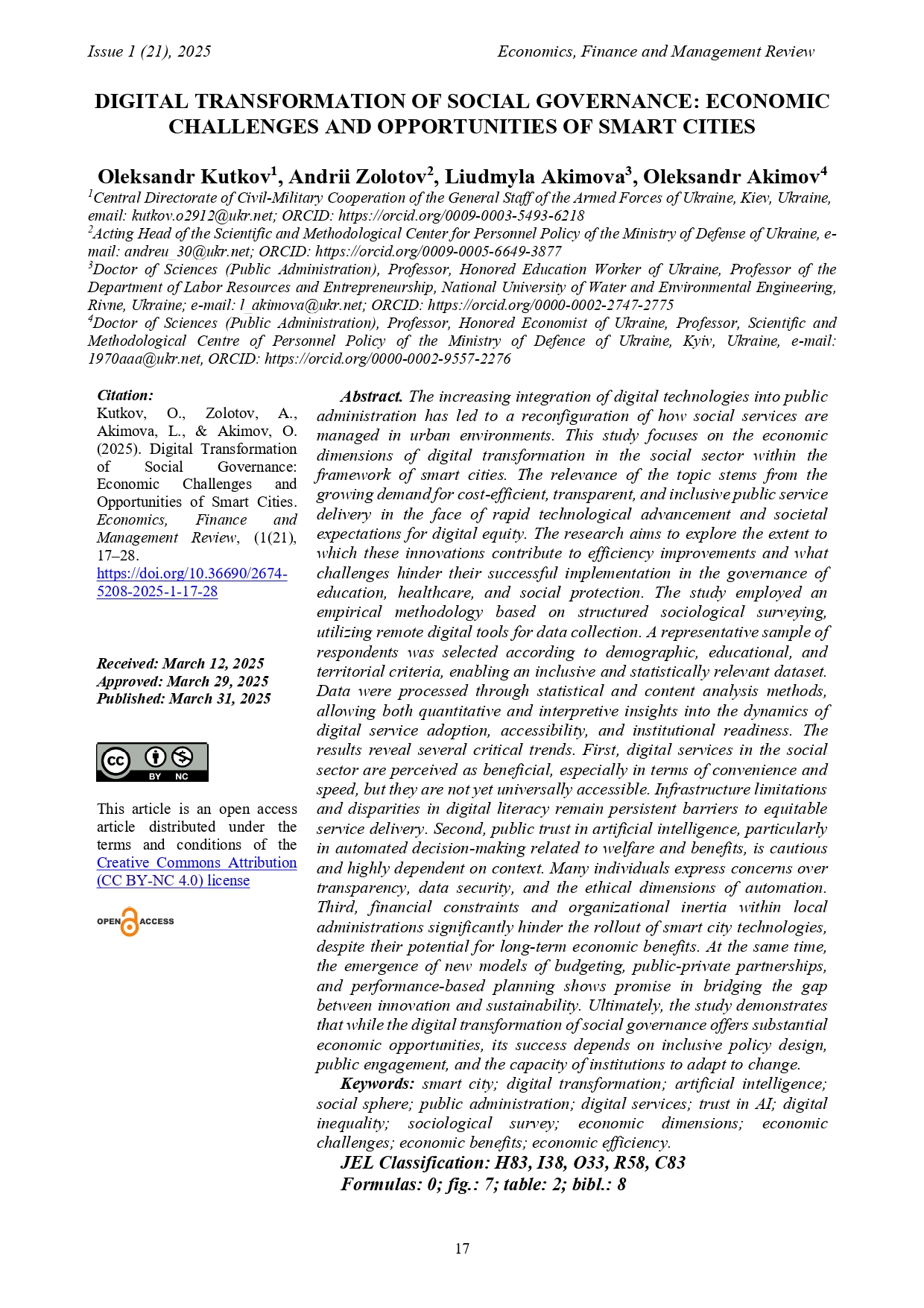DIGITAL TRANSFORMATION OF SOCIAL GOVERNANCE: ECONOMIC CHALLENGES AND OPPORTUNITIES OF SMART CITIES
DOI:
https://doi.org/10.36690/2674-5208-2025-1-17-28Keywords:
smart city, digital transformation, artificial intelligence, social sphere, public administration, digital services, trust in AI, digital inequality, sociological survey, economic dimensions, economic challenges, economic benefits, economic efficiencyAbstract
The increasing integration of digital technologies into public administration has led to a reconfiguration of how social services are managed in urban environments. This study focuses on the economic dimensions of digital transformation in the social sector within the framework of smart cities. The relevance of the topic stems from the growing demand for cost-efficient, transparent, and inclusive public service delivery in the face of rapid technological advancement and societal expectations for digital equity. The research aims to explore the extent to which these innovations contribute to efficiency improvements and what challenges hinder their successful implementation in the governance of education, healthcare, and social protection. The study employed an empirical methodology based on structured sociological surveying, utilizing remote digital tools for data collection. A representative sample of respondents was selected according to demographic, educational, and territorial criteria, enabling an inclusive and statistically relevant dataset. Data were processed through statistical and content analysis methods, allowing both quantitative and interpretive insights into the dynamics of digital service adoption, accessibility, and institutional readiness. The results reveal several critical trends. First, digital services in the social sector are perceived as beneficial, especially in terms of convenience and speed, but they are not yet universally accessible. Infrastructure limitations and disparities in digital literacy remain persistent barriers to equitable service delivery. Second, public trust in artificial intelligence, particularly in automated decision-making related to welfare and benefits, is cautious and highly dependent on context. Many individuals express concerns over transparency, data security, and the ethical dimensions of automation. Third, financial constraints and organizational inertia within local administrations significantly hinder the rollout of smart city technologies, despite their potential for long-term economic benefits. At the same time, the emergence of new models of budgeting, public-private partnerships, and performance-based planning shows promise in bridging the gap between innovation and sustainability. Ultimately, the study demonstrates that while the digital transformation of social governance offers substantial economic opportunities, its success depends on inclusive policy design, public engagement, and the capacity of institutions to adapt to change.
Downloads
References
Andriyenko, А. О. (2023). Uprovadzhennia kontseptsii “Smart City” v upravlinnia velykymy mistamy Ukrainy [Implementation of the “Smart City” concept in the management of large cities of Ukraine]. Hromadska orhanizatsiia “Yevropeiska naukova platforma”. DOI: 10.36074/Andriienko-monograph.2023
Habrel, M., Kosmii, M., & Habrel, M. (2024). Nemateryalni konteksty v kontseptsii «rozumnoho» mista [Intangible contexts in the concept of the “smart” city]. Mistobuduvannia ta terytorialne planuvannia, (86), 243–260. DOI: 10.32347/2076-815x.2024.86.243-260
Kraus, K., Kraus, N., & Marchenko, O. (2022). Inkliuzyvnyi ta universalnyi dyzain suchasnoho mista v umovakh tsyfrovoi transformatsii ekonomiky [Inclusive and universal design of a modern city in the context of digital transformation of the economy]. Efektyvna ekonomika, (2). URL: http://www.economy.nayka.com.ua/pdf/2_2022/91.pdf
Mezentsev, K., Oliinyk, Ya., & Mezentseva, N. (2017). Urbanistychna Ukraina: v epitsentri prostorovykh zmin [Urbanistic Ukraine: At the epicenter of spatial changes]. Vydavnytstvo “Fenyks”.
OECD. (2023). Artificial intelligence and health system performance: Opportunities and challenges. https://www.oecd.org/en/topics/artificial-intelligence.html
Zakharova, O., Kozyriev, D. (2022). The concept of the smart city as an alternative approach to restore the urban infrastructure of Ukraine during the post-war period. Proceedings of Scientific Works of Cherkasy State Technological University. Series Economic Sciences, (67), 5–14. DOI: 10.24025/2306-4420.67.2022.278792
Rachynskyi, A. P. (2024). Integatsiia shtuchnoho intelektu v urbanizatsiini protsesy zadlia staloho rozvytku terytorii [Integration of artificial intelligence into urbanization processes for sustainable territorial development]. Investytsii: praktyka ta dosvid, (4), 190–196. DOI: 10.32702/2306-6814.2024.4.190
Shpak, O., Fedorka, P., & Pryhara, M. (2023). Rozumni mista ta Internet rechei: Vplyv rozrobok u sferi IT na rozvytok mist i pokrashchennia yakosti zhyttia [Smart cities and the Internet of Things: The impact of IT developments on urban growth and quality of life improvement]. Suchasnyi stan naukovykh doslidzhen ta tekhnolohii v promyslovosti, (3), 114–128. DOI: 10.30837/ITSSI.2023.25.114

Downloads
Published
How to Cite
Issue
Section
License

This work is licensed under a Creative Commons Attribution-NonCommercial 4.0 International License.








